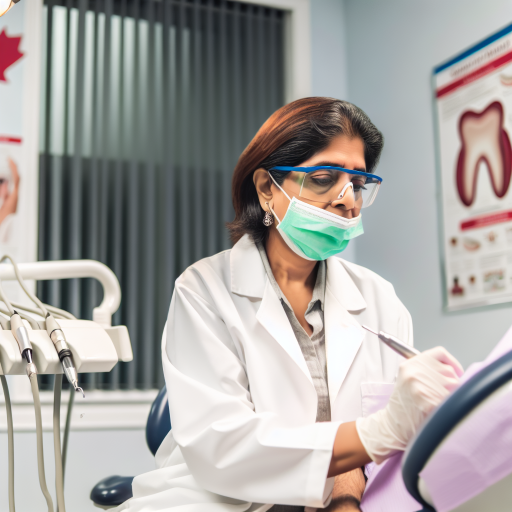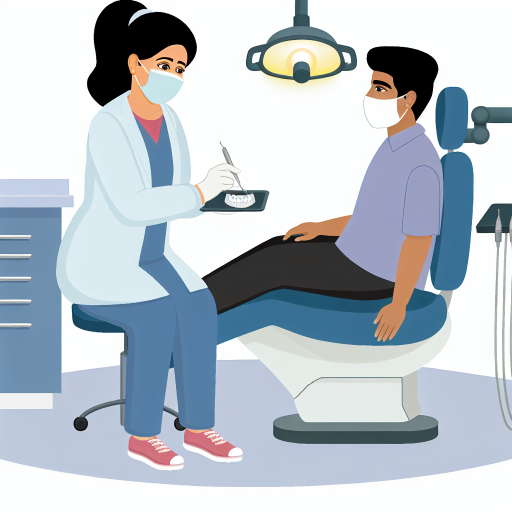Introduction to Dentistry
Definition of Dentistry
Dentistry is a vital branch of healthcare.
It focuses on the diagnosis, prevention, and treatment of oral diseases.
Furthermore, dentistry encompasses various procedures related to teeth and gums.
Importance of Dentistry
Oral health significantly impacts overall well-being.
Healthy teeth and gums enhance one’s ability to eat and speak.
Moreover, good oral hygiene can prevent serious health conditions.
Key Areas of Dentistry
- Preventive dentistry focuses on maintaining oral health.
- Restorative dentistry involves repairing damaged teeth.
- Cosmetic dentistry enhances the appearance of smiles.
- Orthodontics corrects misaligned teeth and jaws.
- Periodontics treats gum disease and other related conditions.
Finding a Dentist
Choosing the right dentist is essential for quality care.
Look for recommendations from friends or family.
You can also consult online reviews for insights.
Finally, consider the dentist’s qualifications and experience.
Daily Responsibilities of a Dentist: A Typical Workday
Morning Routine
A dentist typically starts the day early.
They may review patient schedules and notes before arriving.
This preparation ensures a smooth workflow for the day.
Patient Consultations
The first task often involves patient consultations.
Dentists examine patients and discuss any concerns.
During these consultations, they assess oral health statuses.
Performing Dental Procedures
After consultations, dentists perform various procedures.
This includes cleanings, fillings, and extractions.
They also tend to root canals and crowns as needed.
Collaborating with Dental Staff
Collaboration with dental hygienists is crucial.
Dentists often supervise hygiene treatments and patient education.
Communication ensures all team members are aligned.
Maintaining Records
Accurate record-keeping is an essential task.
Dentists document treatments and patient progress regularly.
This helps track health issues and treatment outcomes.
Unlock Your Career Potential
Visualize a clear path to success with our tailored Career Consulting service. Personalized insights in just 1-3 days.
Get StartedContinuing Education
To stay informed, dentists engage in continuing education.
They attend workshops and seminars periodically.
This keeps them updated on the latest dental technologies and practices.
Wrap-Up and Planning for the Next Day
At the end of the day, dentists review their work.
They may plan for the next day’s appointments.
This planning aids in organizing procedures efficiently.
Educational Pathway to Becoming a Dentist
Required Degrees
To become a dentist, you first need a bachelor’s degree.
This degree typically includes courses in biology, chemistry, and physics.
Next, you must earn a Doctor of Dental Surgery (DDS) or a Doctor of Dental Medicine (DMD).
Both degrees are equivalent and allow you to practice dentistry.
Dental School Admission
Admission to dental school is competitive and requires a strong academic background.
You also need to take the Dental Admission Test (DAT).
This test assesses your academic ability and understanding of scientific concepts.
Length of Education
Typically, dental school lasts four years.
The first two years focus on classroom instruction and laboratory work.
The last two years emphasize clinical practice and patient care.
Licensing Requirements
After earning your degree, you must obtain a dental license to practice.
This process varies by state but generally includes passing national and state exams.
The National Board Dental Examination (NBDE) is a key requirement.
Continuing Education
Dentists must participate in continuing education to maintain their licenses.
This ensures they stay updated with the latest advancements in the field.
Requirements differ by state, so it’s essential to check local laws.
Specialization Options
Dentists can choose to specialize in various fields.
Common specializations include orthodontics, oral surgery, and periodontics.
Each specialty requires additional training and education beyond dental school.
Professional Associations
Joining professional associations can be beneficial for dentists.
Organizations like the American Dental Association (ADA) provide resources and networking opportunities.
Membership also offers discounts on continuing education courses.
See Related Content: From Pharmacists to Dietitians: Canada’s Top Allied Health Careers Explored
Specializations within Dentistry: From General Practice to Oral Surgery
General Dentistry
General dentists provide primary dental care for patients.
They perform routine check-ups, cleanings, and preventive measures.
Additionally, they diagnose and treat various dental issues.
General dentists can refer patients to specialists if needed.
Pediatric Dentistry
Pediatric dentists focus on the dental needs of children.
They are trained to deal with the unique aspects of pediatric dental care.
This includes managing dental anxiety in young patients.
They ensure that children’s teeth develop healthily.
Orthodontics
Orthodontists specialize in aligning teeth and jaws.
They often use braces and other devices to correct misalignments.
Orthodontics can significantly improve a person’s smile and bite.
This specialization requires additional training beyond general dentistry.
Periodontics
Periodontists focus on gum health and disease prevention.
They handle complex cases involving gum surgery and implants.
Periodontal health is critical for overall dental wellness.
They also educate patients on maintaining gum health at home.
Oral Surgery
Oral surgeons perform surgical procedures in the mouth.
This includes tooth extractions and corrective jaw surgeries.
They are trained to manage complications and anesthesia.
Oral surgery often addresses diseases and trauma in the oral cavity.
Cosmetic Dentistry
Cosmetic dentists concentrate on improving dental aesthetics.
They enhance the appearance of teeth, gums, and smiles.
Services may include teeth whitening and veneers.
They aim to boost patients’ confidence through improved smiles.
Prosthodontics
Prosthodontists specialize in restoring missing teeth.
They create dentures, crowns, and bridges for patients.
This field combines art and science in dental restoration.
Prosthodontists work closely with patients to customize solutions.
Endodontics
Endodontists handle issues related to tooth pulp and root canals.
They relieve pain and save teeth that are infected or damaged.
These specialists employ advanced techniques for treatment.
Patient comfort is also a priority during procedures.
See Related Content: Why Remote Healthcare Jobs Are the Next Big Thing in Canada
Essential Skills and Qualities for Dentists
Communication Skills
A dentist must communicate well with patients.
They need to explain procedures clearly and understandably.
Additionally, they must listen to patient concerns attentively.
Attention to Detail
Dental work demands high levels of precision.
A dentist must accurately diagnose problems.
They also need to perform intricate procedures safely.
Problem-Solving Abilities
Every patient presents unique dental challenges.
A dentist must quickly identify the best treatment options.
Furthermore, they should adapt plans as needed during procedures.
Technical Skills
Proficiency with dental tools is essential.
Dentists need to navigate complex equipment efficiently.
They should also keep up with technological advancements in dentistry.
Empathy and Compassion
Many patients feel anxiety before dental visits.
A good dentist reassures and comforts them.
Empathy helps build trust and a strong patient-dentist relationship.
Physical Stamina
Dentistry often requires long hours of focused work.
A dentist should have the endurance to maintain quality over time.
Good posture and ergonomics also support their physical health.
Business Acumen
If they own their practice, business skills are crucial.
Understanding finance and management helps ensure success.
They also need to market their services effectively.
Delve into the Subject: Why Canada’s Aging Population is Driving Demand for Geriatric Healthcare Jobs

The Role of Technology in Modern Dentistry
Advancements in Dental Tools
Modern dentistry leverages advanced tools to enhance patient care.
3D imaging systems allow for precise diagnostics and treatment planning.
Cone beam computed tomography (CBCT) provides detailed views of the jaw.
Laser technology improves the accuracy of soft tissue procedures.
Digital impressions replace traditional molds, increasing comfort and efficiency.
Innovative Treatment Techniques
Innovative techniques streamline dental procedures.
Minimally invasive surgeries reduce recovery time considerably.
Teledentistry enables remote consultations for increased access.
Robotic technologies assist in surgeries for enhanced precision.
The Importance of Software Solutions
Practice management software improves efficiency in dental offices.
This software facilitates scheduling and patient record management.
Electronic health records (EHR) ensure better data security and organization.
Dental imaging software enhances the interpretation of diagnostics.
Patient Experience and Engagement
Technology significantly enhances the patient experience.
Virtual reality (VR) helps in managing dental anxiety for patients.
Online booking systems provide convenience for scheduling appointments.
Patient education apps improve understanding of dental health.
Reminder systems reduce missed appointments and improve compliance.
Future Trends in Dental Technology
Emerging trends signal continued growth in dental technology.
Bioprinting promises to create tissues for dental restoration.
Artificial intelligence (AI) assists in predictive analytics for patient needs.
Wearable devices may track oral health metrics in real time.
Telehealth innovations will expand access to dental care globally.
Discover More: How to Start a Career in Nursing and Thrive in Canada
Common Procedures and Treatments Performed by Dentists
Preventive Care
Dentists focus on preventive care to maintain oral health.
They perform regular check-ups to detect potential issues early.
Professional cleanings remove plaque and tartar buildup.
Fluoride treatments help strengthen tooth enamel.
Dental sealants provide an additional layer of protection on molars.
Restorative Treatments
Restorative treatments address damaged or decayed teeth.
Fillings restore the shape and function of a tooth.
Crowns cover and support weak teeth.
Bridges replace missing teeth to restore smiles.
Dentures offer solutions for those missing multiple teeth.
Cosmetic Dentistry
Cosmetic dentistry enhances the appearance of smiles.
Teeth whitening helps achieve a brighter, more attractive smile.
Veneers are used to cover imperfections on the front teeth.
Bonding repairs chipped or cracked teeth effectively.
Contour and reshaping can alter the size and shape of teeth.
Oral Surgery
Oral surgery encompasses various procedures for complex issues.
Tooth extractions are common for impacted or severely decayed teeth.
Implant placement replaces missing teeth with artificial roots.
Biopsies may be performed to assess suspicious lesions.
Corrective jaw surgery aligns the bite for improved function.
Emergency Dental Care
Dentists also provide emergency care for urgent issues.
They treat severe toothaches to alleviate pain.
Knocked-out teeth may be replanted if addressed quickly.
Fractured teeth require prompt attention to prevent further damage.
Infections are managed to restore oral health and prevent spread.
Challenges and Rewards of a Dental Career
Understanding Job Satisfaction
A career in dentistry presents unique challenges and rewards.
Many dentists find great satisfaction in helping patients.
Daily interactions build strong relationships with clients.
Furthermore, patients often express their gratitude directly.
This appreciation can enhance a dentist’s sense of purpose.
However, the profession also comes with significant challenges.
Common Challenges Faced by Dentists
One major challenge is the stress involved in patient care.
Factors such as difficult cases can heighten this stress.
Additionally, managing a dental practice requires strong business skills.
Financial pressures often contribute to this challenging environment.
Moreover, keeping up with advancements requires continual education.
Rewards of a Dental Career
Despite the challenges, dentistry offers substantial rewards.
For example, dentists enjoy a flexible work schedule.
Many achieve a balance between work and personal life.
Moreover, dentists have the potential for a lucrative salary.
The ability to design their own practice brings fulfillment.
Lastly, contributing to community health enhances job satisfaction.
Perspectives from Professionals
Professionals in the field often share their experiences.
Dr. Emily Chang emphasizes the joy of transforming smiles.
She states that witnessing patient transformations is rewarding.
Similarly, Dr. Mark Reynolds highlights the importance of education.
He enjoys teaching patients about oral health and prevention.
These professionals demonstrate the satisfaction found in the field.




